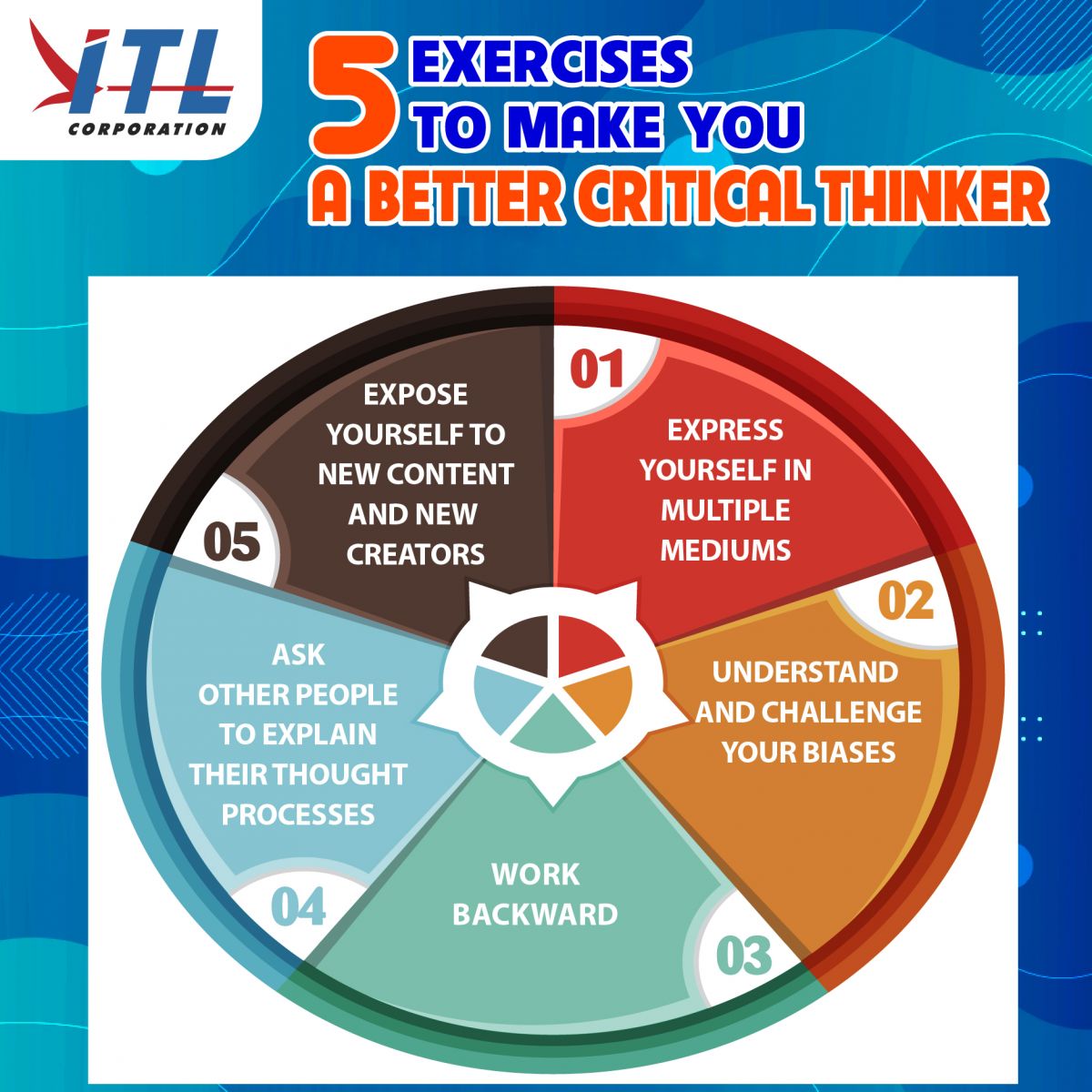06
08/21
5 Mental Exercises To Make You A Better Critical Thinker
Critical thinking is an effective tool for any profession or task. It forces you to analyze things objectively, filtering out your biases, and allowing you to see things from different perspectives, which can improve your creativity. Whether you're trying to brainstorm a new idea, creatively solve an existing problem, or just analyze how and why something went wrong, critical thinking can lead you to better resolutions.

Critical thinking is always in the top 3 of the most important skills of all time, especially in the period of information chaos as currently. However, critical thinking is the skill that takes lots of practices and patience. This skill is not innate and cannot be acquired with just one course.
These exercises and practices can turn anyone into a better critical thinker:
1. Express Yourself In Multiple Mediums: Different people have different styles of thinking and different styles of learning. You may have a strong preference toward visual, auditory, or kinesthetic learning, which is fine, but if you want to think in new directions, it's important for you to try thinking (or at least expressing yourself) in different mediums. For example, if you've been talking about a problem out loud, try to diagram it. If you've been staring at charts all day, try to write down your interpretations of them. The new perspective can be quite enlightening.
2. Understand And Challenge Your Biases:
Each of us is affected by numerous cognitive biases, some of which affect how we value things and some of which affect how we think. Identifying and challenging these cognitive biases can allow us to work around them. For example, if you know you're affected by confirmation biases, you can specifically look for evidence that contradicts your main assumption.
3. Work Backward:
Working on a problem backward can help you see things you might otherwise ignore. As a simple example, proofreading a document sentence by sentence backward can help you more easily identify spelling and grammatical mistakes. Reconstructing a failure from end to beginning, rather than beginning to end, can help you address the true impact of each phase in the sequence.
4. Ask Other People To Explain Their Thought Processes:
Talk to other people about whatever problem you're trying to solve. It's helpful to get other opinions on solutions to use, but the bigger purpose is to understand their thought processes. Different people have different approaches to the same problem, and understanding those processes can help you refine and expand yours.
5. Expose Yourself To New Content And New Creators:
Similarly, it's good to break out of your comfort zone and expose yourself to new types of content and new creators. Every new author, speaker, or thinker you encounter can teach you something new about the way you think--and introduce you to new facts and ideas you can integrate into your own critical thinking.
*Source: inc.com/nguyenphivan.com

Critical thinking is always in the top 3 of the most important skills of all time, especially in the period of information chaos as currently. However, critical thinking is the skill that takes lots of practices and patience. This skill is not innate and cannot be acquired with just one course.
These exercises and practices can turn anyone into a better critical thinker:
1. Express Yourself In Multiple Mediums: Different people have different styles of thinking and different styles of learning. You may have a strong preference toward visual, auditory, or kinesthetic learning, which is fine, but if you want to think in new directions, it's important for you to try thinking (or at least expressing yourself) in different mediums. For example, if you've been talking about a problem out loud, try to diagram it. If you've been staring at charts all day, try to write down your interpretations of them. The new perspective can be quite enlightening.
2. Understand And Challenge Your Biases:
Each of us is affected by numerous cognitive biases, some of which affect how we value things and some of which affect how we think. Identifying and challenging these cognitive biases can allow us to work around them. For example, if you know you're affected by confirmation biases, you can specifically look for evidence that contradicts your main assumption.
3. Work Backward:
Working on a problem backward can help you see things you might otherwise ignore. As a simple example, proofreading a document sentence by sentence backward can help you more easily identify spelling and grammatical mistakes. Reconstructing a failure from end to beginning, rather than beginning to end, can help you address the true impact of each phase in the sequence.
4. Ask Other People To Explain Their Thought Processes:
Talk to other people about whatever problem you're trying to solve. It's helpful to get other opinions on solutions to use, but the bigger purpose is to understand their thought processes. Different people have different approaches to the same problem, and understanding those processes can help you refine and expand yours.
5. Expose Yourself To New Content And New Creators:
Similarly, it's good to break out of your comfort zone and expose yourself to new types of content and new creators. Every new author, speaker, or thinker you encounter can teach you something new about the way you think--and introduce you to new facts and ideas you can integrate into your own critical thinking.
*Source: inc.com/nguyenphivan.com














